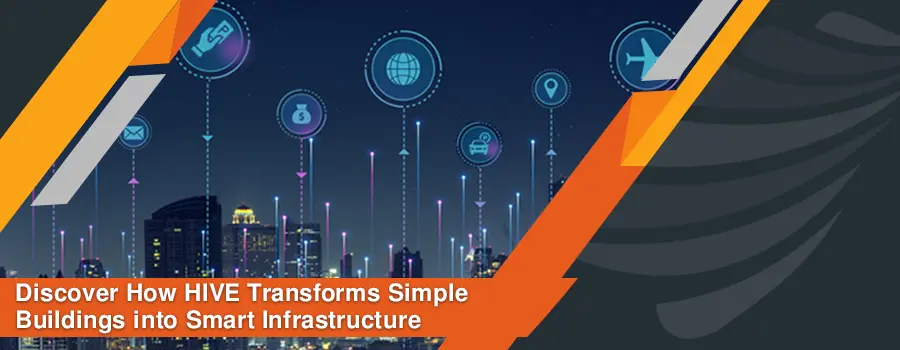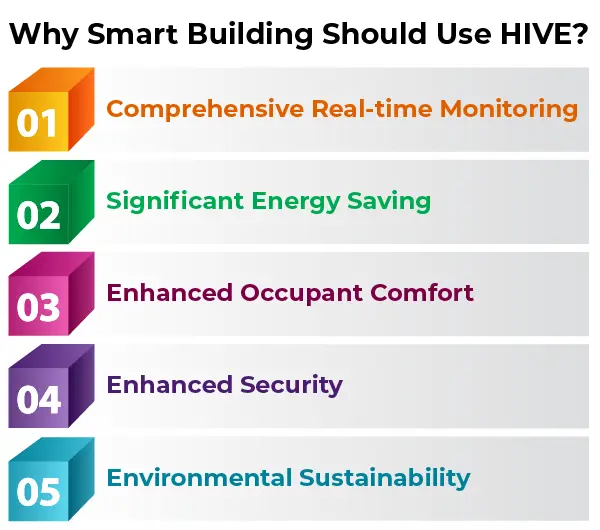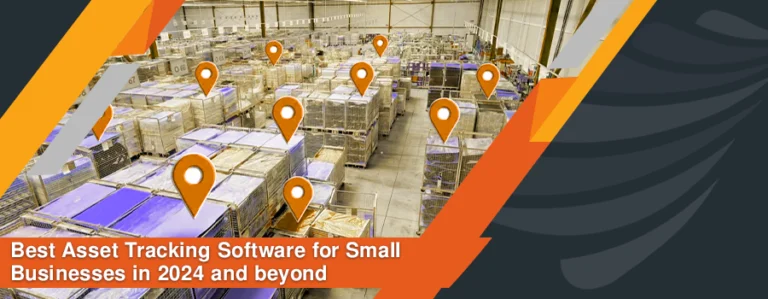Are you struggling to manage your smart buildings/ smart infrastructure effectively? Is ensuring all electrical appliances and systems are switched off when not in use to save costs becoming a burden? Do you wish to eliminate the need for manual management of building sensors, which requires constant employee supervision? If these are your challenges, we understand your concerns and have the perfect IoT-driven solution known as HIVE. This innovative system alleviates these burdens and enhances efficiency, sustainability, and unparalleled convenience.
Let’s delve into this blog to understand how the latest IoT-enabled solutions transform simple building into smart infrastructure, providing enhanced efficiency, sustainability, and unparalleled convenience. You will learn how this latest technology can take your smart building management to the next level, making reducing costs and maintaining control easier and more convenient, giving you peace of mind.
HIVE – Smart Building Management Solution
Traditional building infrastructures are responsible for a significant portion of the world’s energy, resources, waste, and carbon dioxide production. To address this, we are transitioning to smart and sustainable building designs. HIVE, our IoT-enabled solution, is a key player in this transition, significantly reducing energy and resource consumption.
HIVE is an IoT-enabled solution that monitors and manages all sensors installed in the building. Users can see sensor health, shut on or off sensors when needed, and get notified if any sensors have issues. In this way, HIVE becomes a complete solution for managing buildings smartly without the need for huge staff assistance and management.
HIVE minimizes waste, optimizes energy usage, reduces operational expenses, and, most importantly, puts the power in the hands of building owners, tenants, and operators. By effectively monitoring and controlling proactive systems like HVAC, you can save energy, extend the lifespan of equipment, and lessen the risk of managing costly failures. HIVE’s powerful AI-driven SaaS platform is a game changer in smart infrastructure, empowering you to take control and make informed decisions.
HIVE’s strength lies in its ability to integrate with a wide range of IoT sensors, including water, humidity, air quality, temperature, and more, to collect and analyze millions of data points from buildings. Its adaptability and remote management make it a scalable and comprehensive solution. You can understand HIVE as an IoT solution that transforms buildings into efficient, intelligent, and secure spaces, ensuring occupants enjoy a seamless and comfortable environment.
How does HIVE Work?
1. Easy and Quick Sensor Installation
You need to browse the HIVE app’s extensive selection of sensors to find the one that best suits your building infrastructure’s requirements. Technical know-how is optional because installing your sensors is simple. After installation, you need to scan your sensors to easily add them to the interactive dashboard. You may now see trends, set up alerts for the best management, and get real-time data.
2. Scalable Deployment
HIVE collects sensor data in seconds and sends reports, warnings, and reminders when action is needed. It gives users total command and supervision over smart buildings, enabling quick decisions and focused interventions.
3. Unified Data Tracking
After implementing HIVE, obtaining sensors and analyzing data will require you to work with only a few vendors or solutions. The greatest IoT sensors are fully integrated with HIVE, providing a comprehensive view of all data in one user-friendly platform that can be integrated into other systems.
4. Contextual Data Integration
HIVE integrates data from several sources to comprehensively understand smart building infrastructure performance. It allows you to monitor occupancy, indoor air quality, and energy consumption to optimize HVAC and lighting systems and save energy expenses.
5. AI-Informed Actions
By analyzing real-time data and producing automatic insights, HIVE’s AI-driven platform enables you to prioritize maintenance chores, manage energy use, and enhance building efficiency.
6. User Interface
HIVE’s user interface is designed to be intuitive and user-friendly. Building managers can access the platform through a web or mobile app to monitor and control the building infrastructure’s systems from anywhere. The interface provides detailed reports, real-time data visualization, and customizable alerts. You can now see trends, be notified if any issue occurs in a sensor, set up alerts for the best management, turn on or off according to your needs, and get real-time data.
Key Features of HIVE
1. AI-Driven Insights
HIVE uses a powerful Artificial Intelligence (AI) platform to analyze vast sensor data. This translates raw data into actionable insights, enabling data-driven decisions to optimize energy use, predict maintenance needs, and streamline operations.
2. Transform Buildings into Smart Spaces
The HIVE platform integrates with various IoT sensors, from temperature and water usage to air quality. This adaptability allows HIVE to accommodate buildings of any size and integrate with existing systems for a holistic approach to building management.
3. Promote Sustainable Future
HIVE reduces resource consumption, which translates into a smaller environmental footprint. By promoting efficient energy use and minimizing waste, HIVE buildings contribute to a greener future, making HIVE a responsible choice for building owners and operators.
Why Should Smart Buildings/ Smart Infrastructure Use HIVE?
HIVE makes the dream of managing huge buildings easy with just a few clicks. Here’s why smart buildings should use HIVE:
1. Comprehensive Real-time Monitoring
HIVE provides a comprehensive real-time monitoring system for all critical building systems, such as lighting, security, HVAC, and more. This information allows managers to understand operations, identify inefficiency, monitor sensors, and address issues promptly. With real-time monitoring, managers get centralized control of all installed sensors and systems. This makes management simple and negligible, as the need for multiple disparate control systems becomes negligible.
2. Significant Energy Saving
HIVE employs intelligent algorithms that analyze energy consumption patterns and identify areas for improvement. It significantly reduces energy wastage by optimizing HVAC and lighting based on occupancy, time of day, and environmental conditions. Also, with HIVE, buildings can substantially reduce utility bills. The cost savings from improved energy efficiency quickly offset the initial investment in smart infrastructure technology, making it a financially sound decision.
3. Enhanced Occupant Comfort
HIVE ensures that the building environment adapts to the needs and preferences of its occupants. This includes adjusting lighting, temperature, and air quality to create the most comfortable conditions possible. For example, HIVE can automatically lower blinds when the sun is too bright or increase ventilation when indoor air quality drops. A comfortable environment leads to happier occupants, whether residents in a smart apartment building or employees in a smart office. This increased satisfaction can result in higher retention rates and positive reviews, enhancing the building’s reputation.
4. Enhanced Security
HIVE integrates with state-of-the-art security systems, including surveillance cameras, access control, and intrusion detection. This integration provides real-time alerts and can automatically trigger responses to potential security threats, ensuring a safer environment for all occupants. By monitoring security systems continuously, HIVE can identify and address potential threats before they escalate. This proactive approach enhances overall security and provides peace of mind for building occupants and managers alike.
5. Environmental Sustainability
HIVE helps buildings reduce their carbon footprint by optimizing energy usage and minimizing waste. This aligns with global efforts to combat climate change and promotes sustainability. Smart infrastructures using HIVE are more likely to achieve green building certifications such as LEED (Leadership in Energy and Environmental Design) or BREEAM (Building Research Establishment Environmental Assessment Method), which can enhance the building’s marketability and appeal.
In a Nutshell
Advanced technology integrations help transform simple buildings into smart infrastructure. Smart infrastructure offers cost-efficiency, occupant comfort, security, and sustainability, allowing people to experience secure and comfortable living.






